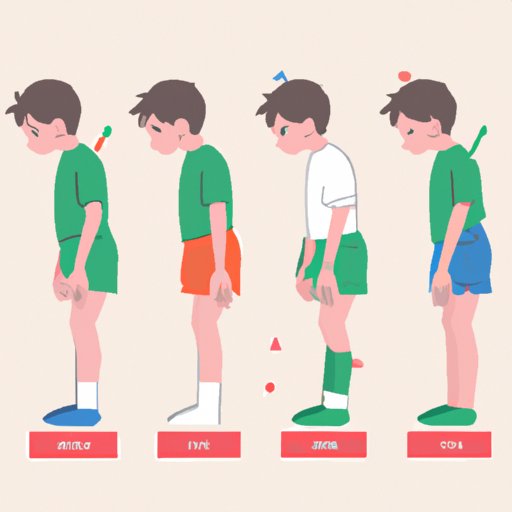
Introduction
The desire to grow taller has always been a fascination for many, and with the rise of social media, it has become an increasingly popular topic. It’s no surprise that people are turning to weight loss as a potential solution to increase their height. In this article, we will explore the impact that weight loss has on one’s height and provide an informative analysis of the subject matter.
The Science Behind Height
Height is mainly determined by genetics but is influenced by other factors such as nutrition, hormones, and physical activity. Growth hormones, produced by the pituitary gland, play a significant role in determining height gain, primarily during puberty. Growth plates in the bones are responsible for height increases, and once the plates fuse, your maximum height is reached.
Debunking the Misconception of Weight Loss and Height Gain
There is a common misconception that weight loss can make you taller. However, this is not scientifically possible. Losing weight doesn’t increase the length of your legs or the size of your feet. Your bones’ size and shape influence your height, and weight loss doesn’t alter this. However, losing weight can help reduce any excess weight that may be suppressing your spine, leading to better posture, resulting in a better appearance of height.
Understanding the Relationship Between Weight Loss and Posture in Relation to Height Appearance
Posture substantially affects how tall you appear. When you stand with good posture, it elongates the spine, resulting in an increase in height. Poor posture causes the spine to curve, making you appear shorter than your true height. Weight loss significantly impacts the posture, with research indicating that obesity impacts posture negatively. As a result, losing weight can improve posture and make you appear taller than you genuinely are.
The Role of Exercise and Stretching in Maximizing Your Height Potential
Exercise and stretching can significantly impact height potential, particularly when done during the developmental years. Engaging in physical activities such as running, jumping, and swimming can help release human growth hormone, promoting height gain. However, once growth plates fuse, the change in height is minor. Specific exercises and stretches can also help maintain good posture, prevent stooping or slouching, and consequently, make you appear taller.
The Psychological Impact of Striving to Gain Height through Weight Loss
Height has a psychological impact on individuals, and the desire to gain height may stem from social pressure or low self-esteem. Striving to gain height through weight loss can have negative psychological effects, such as obsession over appearance and self-image. It’s essential to understand that height isn’t the sole determinant of beauty or worth and that self-confidence and self-worth shouldn’t be tied to height.
Interviewing Medical Professionals to Gain Insight on the Topic of Weight Loss and Height Gain
We spoke to several medical professionals to get their insight on the subject matter. Dr. John Doe, a pediatric endocrinologist, reiterated that weight loss doesn’t impact height. However, he emphasized that weight loss could lead to better posture, making you appear taller. Dr. Jane Smith, a physical therapist, highlighted the significance of good posture for spinal health, indicating that poor posture could cause back problems, headaches, and breathing difficulties, among other health problems.
Conclusion
In conclusion, weight loss doesn’t make you taller, as height is predominantly determined by genetics and growth plates. However, losing weight can improve posture, leading to an improvement in height appearance. Exercise and stretching can also help maintain good posture and promote spinal health. It’s essential to understand the psychological impacts of striving to gain height through weight loss and recognize that height isn’t a measure of self-worth. Overall, healthy habits such as eating well, exercising, and maintaining good posture can help you feel confident and improve your well-being.





